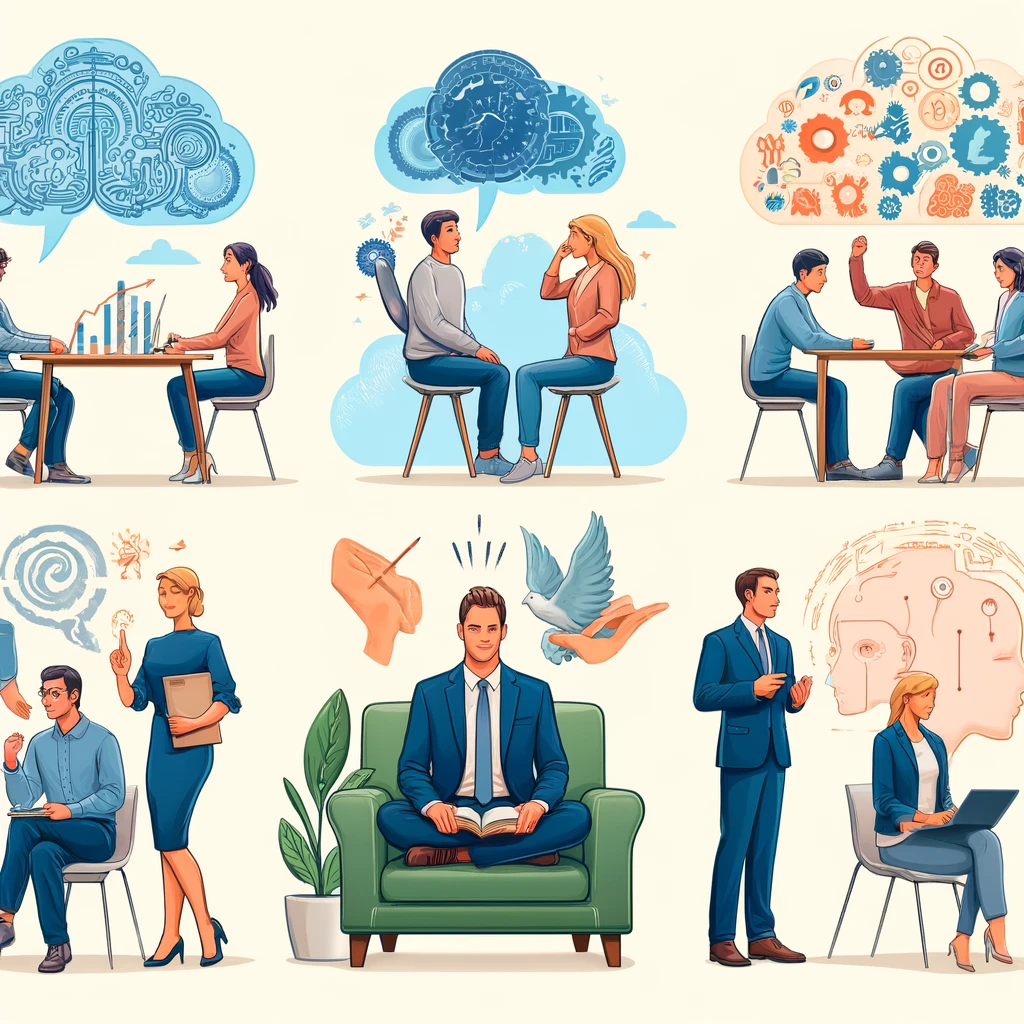In the quest for personal and professional growth, various tools and methodologies promise to unlock our latent capabilities and optimize our performance. Neuro-Linguistic Programming (NLP) stands out as a particularly influential approach. Originating in the 1970s, NLP explores the interplay between neurological processes, language, and behavioral patterns learned through experience.
This methodology asserts that by understanding and manipulating these relationships, individuals can reprogram their minds to overcome barriers, enhance communication, and achieve greater success in various aspects of life. This article delves into the essence of NLP, providing a comprehensive overview of its techniques, history, benefits, and real-life applications that demonstrate its transformative potential.
What is Neuro-Linguistic Programming (NLP)?
Neuro-Linguistic Programming, or NLP, is a psychological approach that involves analyzing strategies used by successful individuals and applying them to reach a personal goal. It relates thoughts, language, and patterns of behavior learned through experience to specific outcomes. Proponents of NLP assume that all human actions are positive. Therefore, if a plan fails to achieve the desired result, it is not the plan at fault but rather the execution of something that can be improved.
Foundational Concepts of NLP
NLP is based on several foundational concepts:
Modeling: NLP began with the modeling of successful therapists and their techniques. The idea is that others can achieve similar results by studying and replicating these successful behaviors and strategies.
Subjectivity of Experience: NLP posits that each person experiences the world uniquely and that this subjective experience can be mapped through language and behavior. Changing the linguistic and behavioral map can change reality.
The Mind-Body Connection: NLP emphasizes the influence of neurological processes and language on our bodies and behaviors. Examples of this connection are techniques such as mirroring body language to build rapport.
Outcome Thinking: This is about focusing on what you want to achieve rather than what you want to avoid. NLP teaches the importance of setting clear and positive outcomes, making it easier to achieve desired results.
Sensory acuity involves being aware of subtle changes in one’s and others’ behavior to guide interactions and communications better.
Understanding these principles is essential for anyone looking to harness the power of NLP to improve their personal and professional lives.

History and Development of NLP
Neuro-Linguistic Programming (NLP) was developed in the 1970s by Richard Bandler and John Grinder, who were interested in identifying the patterns behind successful therapy. Their initial work involved modeling the therapeutic techniques of Fritz Perls (founder of Gestalt therapy), Virginia Satir (a renowned family therapist), and later, Milton H. Erickson (a leading hypnotherapist). This early research formed the foundation of NLP.
The Evolution of NLP
Early Days: In its early days, NLP was heavily influenced by Noam Chomsky’s linguistic theories, specifically transformational grammar. Bandler and Grinder believed these linguistic patterns could be applied to modify a person’s behavior and thought processes.
Expansion and Diversification: Throughout the 1980s and 1990s, NLP grew in popularity and began to diverge into various sub-fields and applications, from psychotherapy to business management, sales, sports, and personal development.
Mainstream Acceptance and Criticism: As Neuro-Linguistic Programming (NLP) expanded, it both entered mainstream acceptance in some areas and faced criticism from others. Critics argued that NLP lacked empirical support and was considered pseudoscientific by some in the psychological community.
Modern NLP: NLP continues to be applied in various fields, with practitioners and trainers worldwide. It has evolved to incorporate findings from new research in neuroscience, psychology, and linguistics.
Understanding the history of Neuro-Linguistic Programming (NLP) provides insights into its development and helps contextualize its techniques and applications in the modern world. This background is crucial for anyone looking to delve deeper into practicing or studying NLP techniques.
Core Techniques of NLP
Neuro-Linguistic Programming (NLP) encompasses a variety of techniques that aim to improve communication, personal development, and psychological well-being. Here, we explore some of the core techniques that are central to practicing NLP effectively.
Key NLP Techniques
Rapport Building: One of the foundational skills in NLP, rapport involves creating a sense of trust and understanding with others. This is often achieved through mirroring and matching another person’s physical behaviors, vocal qualities, or thought patterns to create a bond.
Anchoring: This technique involves associating an internal response with some external or internal trigger, such as touching a specific part of your body to evoke a desired emotional state, like calmness or confidence.
Swish Pattern: This technique changes behaviors by visualizing a trigger and swapping it with a desired outcome in a swift motion in the mind’s eye. It’s particularly useful for altering negative habits.
Meta Model: A linguistic tool that challenges and expands the limits of a person’s model of the world. It involves questioning and refining the language used to describe experiences, which can often be limiting or vague.
Milton Model: In contrast to the Meta Model, the Milton Model is a way of using vague and metaphorical language to communicate with the subconscious mind. It’s used often in hypnotherapy.
Application of Techniques
These techniques can be applied in various settings, including therapy, personal development, education, and business. For instance, educators use NLP techniques to enhance students’ engagement and understanding, while therapists might use them to help clients overcome phobias or anxiety.
NLP’s wide array of tools offers effective ways to improve interpersonal communication, self-regulation, and personal change strategies, making it a versatile approach in many professional and personal contexts.

Benefits of NLP in Everyday Life
Neuro-Linguistic Programming (NLP) offers numerous benefits that can transform daily interactions and personal growth. Its versatile techniques provide practical tools for enhancing communication, building better relationships, and achieving personal goals. Below, we explore some of these benefits in detail.
Enhanced Communication Skills
Neuro-Linguistic Programming (NLP) teaches individuals how to use language effectively to influence and persuade others. NLP practitioners can become more adept communicators by understanding how different words, phrases, and language patterns affect people. This skill is invaluable in personal relationships, business negotiations, and public speaking.
Improved Personal Relationships
Through techniques like mirroring and rapport building, NLP helps individuals connect with others on a deeper level. This can lead to more satisfying and productive professional and personal relationships.
Greater Emotional Control
One of NLP’s core benefits is its focus on self-awareness and emotional self-regulation. Techniques such as anchoring and reframing allow individuals to manage their emotional responses to various situations, fostering better mental health and resilience.
Enhanced Problem-Solving Skills
Neuro-Linguistic Programming (NLP) encourages a solution-oriented approach to challenges, emphasizing positive outcomes rather than obstacles. This mindset shift can drastically improve problem-solving abilities, making overcoming challenges and seizing opportunities easier.
Career Advancement
With its emphasis on effective communication, leadership, and persuasion skills, NLP can be a powerful tool for career development. It equips individuals with the ability to lead more effectively, handle conflicts, and inspire teams, all essential for professional growth.
The benefits of Neuro-Linguistic Programming (NLP) extend far beyond these examples, impacting virtually every aspect of an individual’s life where improvement is desired. By adopting NLP techniques, individuals can enhance their cognitive and emotional resources to lead richer, more successful lives.
Start New with a New Mindset.







